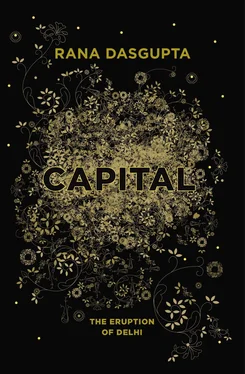• • •
I meet with a psychologist who was involved in counselling the parents of the Nithari victims.
“How could a place like that exist?” he says. “A lot of police officers were going there for parties. It channelled the worst aspects of the collusion between police and corrupt business. There were orgies and call girls, but no one was questioned when people started going missing. Such people have complete impunity. Businessmen like that pay off the police and arrange girls for them as part of their normal business operations.
“What kind of culture have such people created for us? They have treated everyone as abject, and people have therefore become abject.
“I was conducting a grief session for the parents of Nithari victims. Someone came into the room and announced that a politician had arrived outside. Everyone ran out of the room except one parent because rumours of compensation money were circulating. These rumours were untrue and after a while people began to file back in again. A discussion began in the room about the 5-lakh [$10,000] sums that had been rumoured. And parents said, ‘If we had known there would be 5 lakhs for a dead child, we would have sent two children.’
“And I sat there and I thought, why have I bothered to come? Why am I here?
“You think that there are certain primordial events that eclipse all others. You think, for instance, that no suffering can be so great as that of a parent who has lost a child. But there are things that are even worse, forms of suffering so great that they harden people even to the death of their children. And you can see them everywhere in this country.”
Mangoes are surely the most literary fruit. Countless tales have been told, in this part of the world, about their magical power; many more concern the wily stratagems by which loveable thieves — or children, or monkeys — successfully purloin mangoes from the trees of miserly owners. The mango has a prominent place, too, in literature that touches on sexual desire, for though its pubescent lobe does not properly resemble any part of the human anatomy, male or female, it still manages to incite mysteriously erotic thoughts.
When, in the blinding heat of Delhi’s May, mangoes begin to pile up on vendors carts, it is easy to feel they have fallen out of a fairytale. Imagine: it is forty-five Celsius in the afternoon, and even the sky is seared white. The wind blows in from the bitter plains like the blast from a clay oven, and no moisture can survive. Laundry hung outside has the water sucked out of it in five minutes by the parched air, which sucks at bodies too, drying out eyes and tongues, dehydrating the very innards.
Amid such universal desiccation, the unabashed, chin-dripping wetness of the many species of mango that suddenly pour into the city is a miracle. That merciless nature should supply such consolation for its own ravages, that it should display simultaneously such brute impact and such subtle deliquescence, is literary already. Like rags that turn to riches, or fools who outwit kings, mangoes attract stories because they overturn the general logic of the world.
Cut up into small cubes whose sunshine orange is their concession to the season, it is mangoes that appear on the table now. My friend Gautam and I take a bowl each and eat with relief. The fruits have come out of the fridge, and they restore our systems to some kind of balance after the climatic emergency from which we have just come in.
We sit in semi-darkness, for all the blinds are closed against the angry glare outside. A quiet glow emanates from the corner of the room, where a glass box containing a plastic model of the Taj Mahal fluoresces in alternating colours. The fan churns like the rotors of a helicopter.
Gautam and I have stopped here to pick up one of his friends, Ranjit. But he is not back from work; we sit in the front room and chat to his father, Baljeet, while his mother brings more snacks from the kitchen. We sit on sofas covered with white sheets. Ranjit’s mother flicks on a fluorescent light in honour of our arrival, which bathes the room in green.
Baljeet is rotund, and gives his weight entirely to the support of a worn armchair. He wants to tell us about his latest scheme, in which there have been some encouraging recent developments. He takes out a scruffy bit of paper from the pocket of his white kurta and hands it to me, chuckling conspiratorially. It is a receipt for 2,000 rupees, and it is dated April 1980.
“This is a receipt from a DDA lottery.”
The Delhi Development Authority was set up by Nehru’s government as a consolidation of the capital’s various planning and development agencies. It had sole responsibility for the city’s development and, in order to fulfil this, it had the right to acquire land forcibly and at greatly reduced prices. It was a development monopoly, whose exclusivity was guaranteed by laws making it impossible for private individuals or companies to own more than a few acres of land within the Delhi borders. At various points, however, it released plots of land to individuals through lotteries. Entrants paid a non-refundable fee to enter the lottery and waited, sometimes years, to hear if they had been selected for a plot. If so, they could then buy it at a guaranteed rate.
“This lady entered a lottery in 1980 and she still hasn’t heard anything. But this year she is likely to get a plot. I mean, she will get a plot. She doesn’t know she’ll get it of course. But I know because I have contacts in the DDA. So I am trying to buy her receipt from her. After thirty years she won’t care about it anymore: she’ll be happy to give it up. In fact she has already said she wants to sell. So the plot will be allotted to me. It should be worth about 15 lakhs [$30,000].”
He clasps the arms of his armchair as if it were a throne, and sits up, inspecting my face for signs of approbation.
“You have to know people in the DDA for this kind of business. DDA officials are transferred every two to three years to prevent corruption, so you have to keep building those relationships: take them out, take them gifts.
“When the plot is finally allotted to me, I’ll pay all my contacts. Twenty thousand [$400] here, twenty thousand there.”
In Baljeet’s universe, this is what business is. Business is a lottery run by cheats, and anyone who gets involved had better be prepared for the consequences. This time you might be lucky enough to outwit others. Next time round, it will probably be different.
“I’ve made crores and I’ve lost crores. I’ve probably lost 60 lakhs [$120,000] in scams. One person sold me a property that didn’t exist. I paid 40 lakhs [$80,000] for it. Most of that was cash: the paper value of the property was only 6 lakhs [$12,000]. So 34 lakhs [$68,000] just disappeared, but I filed a legal case for the other 6 lakhs. The DDA came back and told me I had no case. Some guy in the DDA was playing with two people over one property, and accepting money from both.”
Baljeet retired some time ago from a long career with the Bank of Maharashtra. Since this was one of the banks nationalised during the prime ministership of Nehru’s daughter, Indira Gandhi, Baljeet was effectively an employee of the Indian government. Much of his career was devoted to delivering on Mrs Gandhi’s populist promises for the state-run banks: he worked in some of the remotest parts of the country to set up branches which were, in many cases, the first contact those regions had with formal banking services. In 1976, while still working for the bank, Baljeet began to speculate in property. This is what occupies his time, and especially his thoughts, now.
“Another time I bought a shop in the market near here. I started running the shop and it was going well. But what I didn’t know — which the person who sold it to me did — was that it was soon going to be demolished. A powerful real estate developer wanted to build there. He had political support. And since my shop was an illegal construction — it wasn’t within the approved limits of the market — it didn’t officially exist and I could get no compensation for it. So I lost 23 lakhs [$46,000] there.”
Читать дальше











